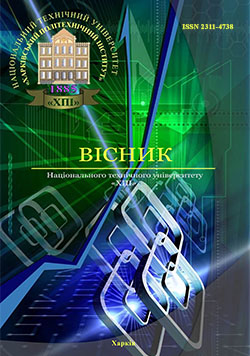RESEARCH ABSORBING STATES OF THE SYSTEM USING MARKOV CHAINS AND FUNDAMENTAL MATRIX
DOI:
https://doi.org/10.20998/2413-3000.2016.1174.4Keywords:
model of success criteria, Markov‘s chains, absorbing state of the system, the canonical form, the fundamental matrixAbstract
The article discusses the use Markov chains to research models that reflect the essential properties of systems, including methods of measuring the parameters of projects and assess their effectiveness. In the study carried out by its decomposition system for certain discrete state and create a diagram of transitions between these states. Specificity displays various objects Markov homogeneous chains with discrete states and discrete time determined by the method of calculation of transition probabilities. A model of success criteria for absorbing state system that is universal for all projects. A breakdown of passages to the matrix submatrices. The variation elements under matrix Q n with growth linked to the definition of important quantitative characteristics of absorbing circuits: 1) the probability of achieving the status of absorbing any given; 2) the mean number of steps needed to achieve the absorbing state; 3) the mean time that the system spends in each state to hit irreversible system in absorbing state. Built fundamental matrix that allowed calculating the different characteristics of the system. Considered fundamental matrix for supposedly modeled absorbing Markov chain, which gives the forecast for the behavior of the system in the future regardless of the absolute value of the time elapsed from the starting point. This property illustrates the fundamental matrix Markov process that characterizes it as a process without aftereffect.References
Yaroshenko F., Bushuyev S., & Tanaka H., (2012). Management of innovative projects and programs on the basis of knowledge P2M. Kyiv: Summit Book, 272.
Gogunsky V. D., & Rudenko S. V. (2008). Basic laws of project management. Project Management: Status and Prospects: Fourth international conference. Mykolaiv: NUS, 37-40.
Kolesnіkova K. V. (2014). Development of project management theory: justification for initiating project law. Management of development of complex systems, 17, 24-31. doi.org10.13140/RG.2.1.3669.4487.
Teslenko P. A., & Gogunsky, V. D. (2010). Evolutionary Paradigm of Project Management. Project Management: Status and Prospects. Sixth international conference. Mykolaiv: NUS, 114-117.
Bushuyev S. D., & Bushueva N. S. (2010). Mechanisms of value in the work of project-driven organizations. Eastern-European Journal of Enterprise Technologies, 1/2 (43), 4-9.
Beloschitsky A. A. (2012). Vector method of goal-setting projects in design-vector space. Management of development of complex systems, 11, 110-114.
Vaysman V. O., Velichko S. O., & Gogunsky V. D. (2011). System of standards for enterprise knowledge management in project-driven organizations. Odes. Polytechnic University. Pratsi, 1 (35), 257-262.
Kolesnikova E. V., Kostrova G. V., & Prokopovich I. V. (2007). Methods of assessing the quality of technical systems. Odes. Polytechnic University. Pratsi, 1 (27), 128-130.
Vaysman V. A., Lukianov D. V., & Kolesnikova K. V. (2012). The planar graphs closed cycles determination method. Odes. Polytechnic University. Pratsi, 1 (38), 222-227. doi.org10.13140/RG.2.1.1880.9687.
Rudenko S. V., Kolesnikova E. V., & Bondar V. I. (2012). Network project management processes in the context of project status display. Problems technology, 4, 61-67.
Olekh T. M., Oborskaya A. G., & Kolesnikova E. V. (2012). Methods of evaluation of projects and programs. Odes. Polytechnic University. Pratsi, 2 (39), 213-220. doi.org10.13140/RG.2.1.2080.2005.
Olekh T. M., Gogunsky V. D., & Rudenko S. V. (2013). Evaluation of environmental projects. Eastern-European Journal of Enterprise Technologies, 1/10 (61), 79-82. doi.org10.13140/RG.2.1.2885.3209.
Olekh T. M., Gogunsky V. D., & Tkachuk S. V. (2014). Multidimensional evaluation of projects via Markov models. Evolutionary Paradigm of Project Management. Project Management: Status and Prospects. Tenth international conference. Mykolaiv: NUS, 196-199.
Kemeny J., & Snell J. (1970). Finite Markov Chain. Moscow: Nauka, 129.
Vaysman V. A., Gogunsky V. D., & Tonkonogy V. M. (2012). Methodological fundamentals of quality management: factors, parameters, measurement, evaluation. Modern technologies in engineering, 7, 160-165.
Downloads
Published
Issue
Section
License
Copyright (c) 2016 Тетяна Мефодіївна ОЛЕХ, Віктор Дмитрович ГОГУНСЬКИЙ, Юлія Сергіївна БАРЧАНОВА, Катерина Миколаївна ДМИТРЕНКО

This work is licensed under a Creative Commons Attribution-NonCommercial-ShareAlike 4.0 International License.
Our journal abides by the Creative Commons copyright rights and permissions for open access journals.
Authors who publish with this journal agree to the following terms:
Authors hold the copyright without restrictions and grant the journal right of first publication with the work simultaneously licensed under a Creative Commons Attribution-NonCommercial-ShareAlike 4.0 International License (CC BY-NC-SA 4.0) that allows others to share the work with an acknowledgement of the work's authorship and initial publication in this journal.
Authors are able to enter into separate, additional contractual arrangements for the non-commercial and non-exclusive distribution of the journal's published version of the work (e.g., post it to an institutional repository or publish it in a book), with an acknowledgement of its initial publication in this journal.
Authors are permitted and encouraged to post their published work online (e.g., in institutional repositories or on their website) as it can lead to productive exchanges, as well as earlier and greater citation of published work.

